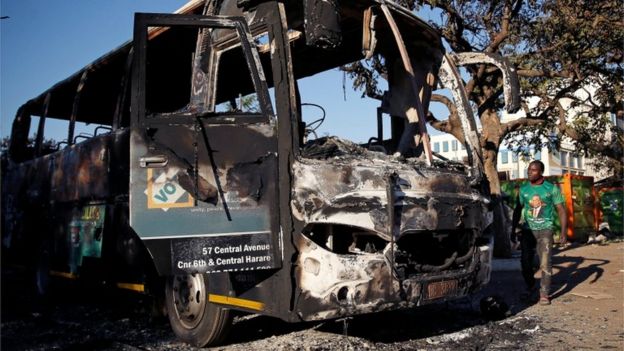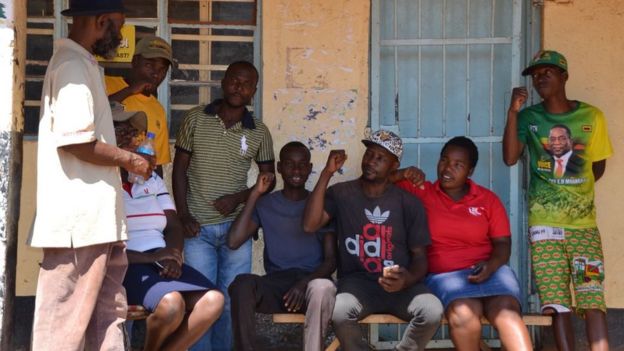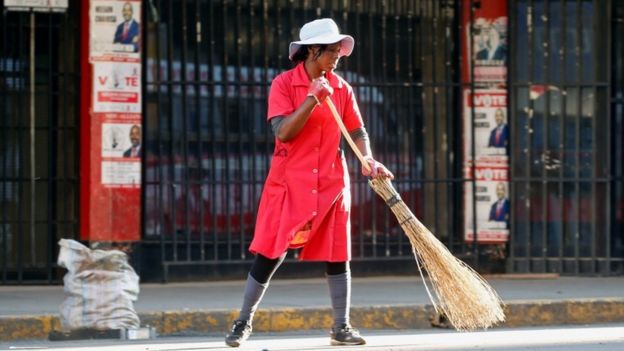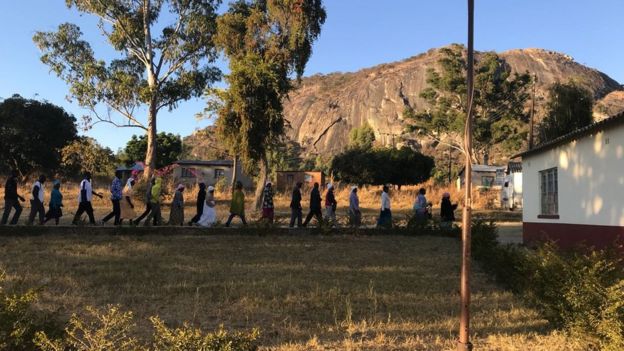Businesses have shut in Zimbabwe’s capital, Harare, as the nation awaits results from the heavily disputed presidential election.
Armed soldiers and police are on patrol, ordering people to “behave”.
Three people were killed in the city on Wednesday in clashes between the security forces and supporters of opposition leader Nelson Chamisa.
He says Monday’s polls were being rigged to give President Emmerson Mnangagwa victory.
Mr Chamisa insists he has won, and has called on his supporters to await “mass celebrations”.
The elections were the first since long-time ruler Robert Mugabe, 94, was ousted in November.
The polls were intended to set Zimbabwe on a new path following Mr Mugabe’s repressive rule.
However, Mr Chamisa’s MDC Alliance has accused the military of using excessive force to quell Wednesday’s protests.

The government has blamed the opposition for the violence
Mr Mnangagwa said the government was in talks with Mr Chamisa to defuse the crisis and proposed an independent investigation to bring those who were behind the violence to justice.
“This land is home to all of us, and we will sink or swim together,” Mr Mnangagwa said in a series of tweets.
No violence was reported on Thursday. A truckload of armed policemen and soldiers were driving around the city shouting, “Behave yourself, people of Zimbabwe.”
A BBC reporter in Harare says the city centre is like a “ghost town”.
Riot police also surrounded the headquarters of the MDC Alliance.
‘Winners and losers in every match’
There is an air of nervousness tonight in Harare, an opposition stronghold which usually has a bustling city centre.
Earlier, I was in the small town of Concession, an hour’s drive north of the capital. It is a Zanu-PF stronghold, and the mood there was carefree and jovial. Locals have elected a Zanu-PF MP again, and expect to walk away with the presidency as well.

The mood is more upbeat outside the capital
Patience Simeon, 29, told me: “The MDC need to know that Harare is not Zimbabwe. We have also lost seats in other parts of the country but did not go to the streets. Why turn a peaceful election into violence? What happened on Wednesday is wrong.”
Lloyd Chingulu, also 29, agreed, saying: “I don’t know why people are panicking. If they lose they must accept the result. There are winners and losers in every match.”
Nevertheless, one thing became clear from my conversations with people in Harare and Concession. They want the same thing – the economy to grow and for jobs to be created. But for that to happen, they may need to set aside political rivalries.
How have foreign powers responded?
UN Secretary General Antonio Guterres urged Zimbabwe’s politicians to exercise restraint, while UK foreign office minister Harriett Baldwin said she was “deeply concerned” by the violence.
The US embassy in Harare advised its citizens to avoid the city centre, following Wednesday’s unrest.

Sweeping up a day after the unrest outside the MDC Alliance’s HQ
In a message to Zimbabwe’s politicians, the embassy said there was a “historic opportunity to move the country towards a brighter future”.
“Violence cannot be part of that process,” it added.
China, Zimbabwe’s main international ally, said it hoped all sides would put the country’s interests first following a “generally peaceful and orderly” election.
What happened after the vote?
The day after the election, the MDC Alliance said Mr Chamisa had won the presidential election, pre-empting an official announcement and prompting its supporters to celebrate in some areas of Harare
When Zec announced that Zanu-PF had won the parliamentary vote by a landslide on Wednesday, things turned nasty.
The opposition supporters were are also angered by the delay in announcing the presidential results.
Home Affairs Minister Obert Mpofu said the government would not tolerate such protests.
The opposition “are testing our resolve, and I think they are making a big mistake”, he said.
A spokesman for Mr Chamisa condemned the deployment of soldiers and the subsequent loss of life.
“Soldiers are trained to kill during war. Are civilians enemies of the state?” he asked.
“There is no explanation whatsoever for the brutality that we saw.”
Which results have been declared?
Zec has announced all parliamentary results. Although Zanu-PF won by a landslide, it gained fewer seats than in the 2013 election.
More than five million people were registered to vote, and there was a turnout of 70%.
Zec said the verification of the presidential election result was “going very well”.
There had been a delay because of the need for party agents to verify the result, it said.
The electoral commission confirmed on Thursday that its website had been hacked, saying it took it down “within 11 minutes” of the attack.
In terms of the law, Zec has until Saturday to announce the result.
A presidential candidate needs more than 50% of the vote to win outright. Otherwise, a run-off election will be held on 8 September.
What are election observers saying?
The European Union and Commonwealth missions criticised the delay in announcing the presidential results.

The electoral commission says 70% of registered voters took part in the election
This is the first time in 16 years that the government has allowed EU, Commonwealth and US election monitors into the country.
The Commonwealth said parties should use “all available conflict resolution mechanisms” to resolve differences.
“The electoral process is yet to be concluded. The greatest test of leadership is called for now,” its mission said.
